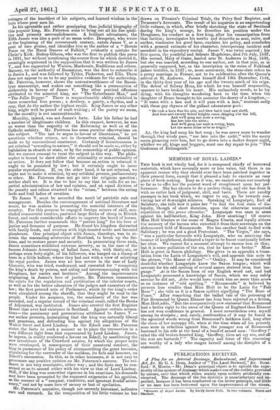MEMOIRS OF ROYAL LADIES.*
TB's book is not wholly bad, for it is composed chiefly of borrowed materials, which have severally more or less value, • but there is no apparent reason why they should ever have been patched together iu their present form, except that it pleased a lady to execute an easy piece of book-making. Easy as it was, we cannot strain our courtesy so far as to offer her the poorest word of compliment upon her per- formance. She has chosen to do a useless thing, and she has done it with an entire lack of judgment, skill, and taste. There are sundry passages in her book which, we regret to say, go far towards con- victing her of downright silliness. Speaking of Longuepee, Earl of Salisbury, she tells how it pains her " to find the foul stain of dis- loyalty, though of short duration, upon the otherwise unspotted reputation of this preuz chevalier." Longuepie was once in arms • against his half-brother, King John. How shocking ! Of course Miss Holt blushes at the name of Magna Charta, and loyally abhors the memory of the barons who extorted it from their sovereign on the dishonoured field of Runnymede. She has another fault to find with Salisbury ; he was not a good Protestant. " The Virgin," she says, "was a particular favourite with Longuepee, who on receiving the honour of knighthood, dedicated a taper to he burnt continually before her altar. We cannot for a moment attempt to excuse him IN this; but it is some palliation of the sin, that lie knew no better." Miss Holt is great in Saxon philology. She gives in an appendix a trans- lation from the Latin of Louguipee's will, and appends this note to the phrase, " the Manor of Aclee"—" Oakley. It may be considered doubtful whether Longuepee knew the Saxon tongue; which will account for his odd spelling of several names derived from that len- ay." Ac is the Saxon form of our English word oak, and had Longuepee possessed a knowledge of Saxon, which we may safely assume he did not, delft would have struck him no more than acorn as an instance of "odd spelling." " Rosaniunda " is believed by persons less erudite than Miss Holt to be the Latin for "Fair Rose" ; she tells us it is a Saxon epithet signifying " The Rose of Peace." After remarking that the ballad tale of the poisoning of Fair Rosamond by Queen Eleanor has long been rejected as a fiction, Miss Holt:adds, "But the comparatively new statement that Rosamond had a better right to the name of the Queen of England than Eleanor has not won confidence in general. I must nevertheless own myself among its disciples ; and, surely, confirmation of it may be found in the agonized words wrung from Rosamond's faithless lord, long after the close of her unhappy life, when at the time when all his princely sons were in rebellion against him, the younger son of Rosamond hastened to his side at the head of a hand of armed men: Geoffrey I' cried the old broken-hearted king, Geoffrey, thou art my son, and all the rest are bastards !' " The sagacity and force of this reasoning are worthy of a lady who ranges herself among the disciples of a statement.






























 Previous page
Previous page